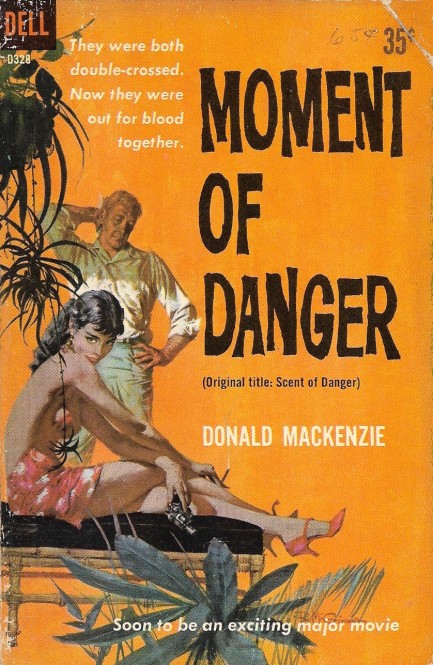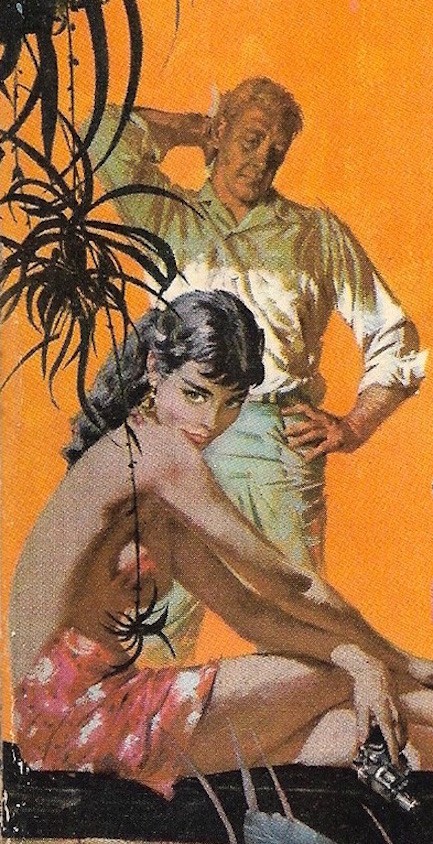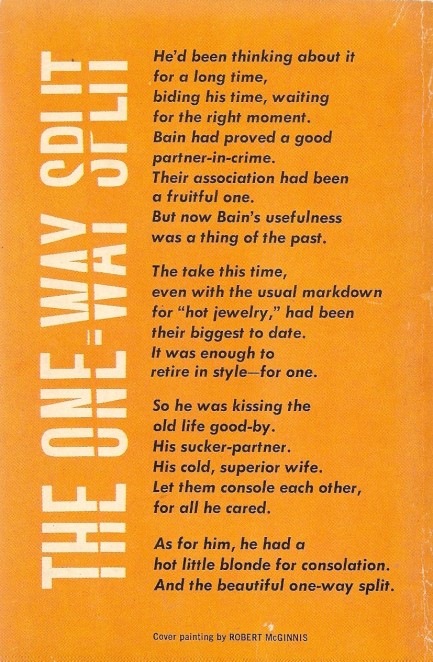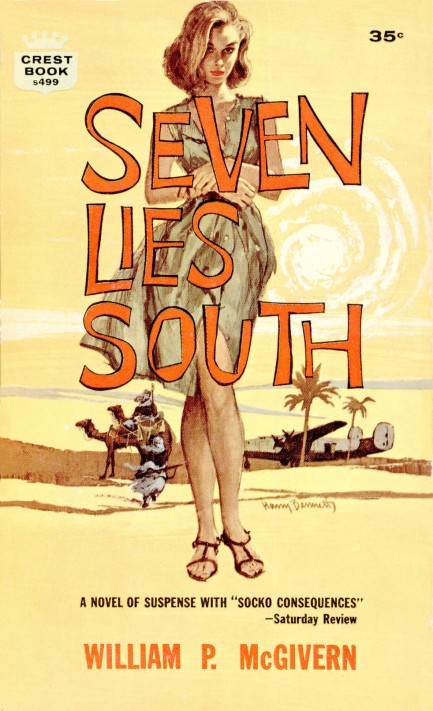| Vintage Pulp | Apr 14 2022 |

From moment to moment everything can change.

Donald MacKenzie's Moment of Danger, also known as Scent of Danger, appeared in 1959 as a Dell paperback with a front painted by the busy Robert McGinnis, always the man to employ for elevated cover art. In this case, his pistol packing, sarong clad femme fatale lounging behind a spider plant stands as a top effort. And by the way, we only know what a spider plant is because we have six large ones busily propagating around palatial Pulp Intl. HQ.
The tale follows a double-crossed jewel thief named Macbeth Bain (you gotta love that) who vows revenge on the partner who ditched him after a big heist and put the cops onto him. The double-cross is only half successful. The partner gets away with the loot, but through a stroke of luck, the evidence that was supposed to put Bain behind bars never materializes. Now he's free, furious, and tracking his missing partner from London to Gibraltar, Tangier, and Malaga, seeking to even the score. Along for the adventure is the partner's wife, also intent upon revenge after being ditched for another woman.
This is a densely written tale, heavy on narrative and light on dialogue, told from Bain's point of view as he struggles with fear of his uber-competent partner, and attraction toward his beautiful sidekick. He's a curious character, hard to like at first because his emotions range from anger at his betrayal to resentment that a woman is tugging at his heart, but you eventually root for him. The book ends almost anti-climactically, mid-scene at a crucial moment, but it remains a decent whirlwind thriller that passes through several exotic cities, and is worth the reading time, imperfections and all.
Hollywood agreed. The big brains out in Tinseltown liked Moment of Danger enough to option it and make it into a 1960 movie titled Malaga, starring Trevor Howard and Dorothy Dandridge. We'll definitely watch it because it's a noteworthy film, representing a rare leading role for an African American actress, and in fact was Dandridge's last movie. Our film watching résumé is a bit thin on the Dandridge front anyway, so we now have a good reason to address that. We'll of course report back.




| Vintage Pulp | Mar 3 2022 |

I know these regional airports lack the usual amenities, but a shuttle to the terminal sure would be nice.

We've mentioned before that we like to read books about places we've been, but we had no idea the 1960 thriller Seven Lies South was set in Spain and Morocco. We impulse-bought this 1962 Crest edition after seeing William P. McGivern's name and taking in the striking Harry Bennett cover art featuring a woman, an aircraft, two bedouins, and their camels. McGivern wrote the excellent 1961 juvenile delinquent thriller Savage Streets, so that was all we needed to know. We found out in the first page that the setting, as the story opened, was Malaga, Spain, and went, “Oh, okay—even better.”
The book stars Mike Beecher, a former bomber pilot, now in his late thirties and doing a belated Lost Generation bit—idleness, parties, a rotating cast of acquaintances, and a lot of solitary reflection in a foreign land. His Sun Also Rises-style fatalism is a little tedious, in our view. After all, he was never wounded in the sex organs like Jake Barnes, and if one's naughty bits function, there's always reason to smile. In any case, one day he meets a beautiful young woman named Laura Meadows, who embodies his dissatisfaction:
She symbolized everything that was unobtainable, beyond his reach; the rosy and prosperous life of America, with the tides of success sweeping everyone on to fine, fat futures.
But not everyone, of course. Entire ethnicities were excluded from that sweeping tide of success. Things are unobtainable for Beecher, but only because he's made a choice to reject them. What a luxury, to reject something, then bemoan what one “can't” have, when many people really can't have it. It's not a flaw in the book, so much as a cultural blind spot—perhaps deliberately inserted by McGivern, who was generally insightful about such issues. You have to sort of smile at Beecher's inability to appreciate being reasonably young, healthy, and knocking around the south of Spain drinking wine. Not everyone gets to do that. That's exactly what we do, and we appreciate it every day.
Beecher is coerced into helping to steal a plane headed for Morocco, but the mission goes wildly sideways, which unexpectedly mutates the narrative into a desert survival adventure. In order to set up and progress through this section, McGivern has his characters sometimes undertake actions that don't exactly resound with logic, but even so the book is good. McGivern can really write, even when it verges on the preposterous. He was more at home in the suburbs of Savage Streets, but he navigates the Spain and Morocco of Seven Lies South deftly enough. We have no hesitation about trying him again.




































































